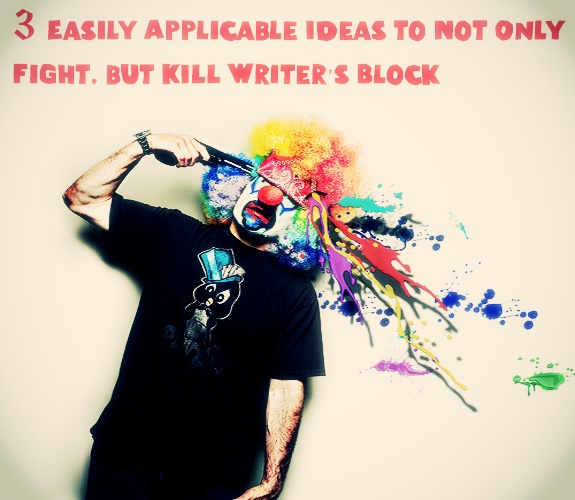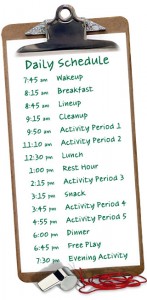This is a guest post by Karol K from Online Business Design blog.
“Plumbers don’t get plumber’s block.”
… I’m sure you’ve heard that before… Every blogger/writer had. It probably even makes you feel a little depressed when you hear it… Plumbers don’t get plumber’s block. Drivers don’t get driver’s block. Bakers don’t get baker’s block. Teachers don’t get teacher’s block. Are you the only creäture in the universe with a block?
Surely not the only one. There’s the government and 100% of politicians that share the same problem, but anyway, today we’re discussing bloggers and writers.
So let me tell you why writers are so prone to having a block. First of all, this is nothing to be ashamed of. It just happens, once in a while. Like spilling milk, or losing keys to your car.
The main reason is that writing is one of those creativity-heavy activities. It’s not something you can do just like that without being in the right state of mind. Creativity can’t just be called upon or summoned… like ordering a pizza, for example. There’s no pill for improving your levels of creativity.
Plumbing is not a creativity-heavy activity. That’s why there’s no plumber’s block.
Thankfully, you are not standing on a losing position. Even though creativity seems to be something ungraspable, you can still do some things to help you get into the right mindset when it’s time to sit down and get some pages done.
This is exactly why the following three ideas work. They are not the remedy, they are prevention pills.

1. Have a Bank of Ideas
Let me be honest with you. Without my bank of ideas I would be able to write absolutely nothing. And “bank of ideas” is just a fancy name for a mindmap with all my ideas for new blog posts in it.
(By the way, check out FreeMind – great mindmapping software.)
Such a thing can help you a lot. One reason; trying to come up with an idea for a post is completely different from writing the actual post. The most common case of writer’s block happens when you don’t know what to write about, not when you don’t know what to write about a SPECIFIC topic.
If your bank of ideas has more than 20 items in it, I am 100% sure that you’ll find a compelling topic, no matter what mindset you’re currently in.
The fact that we can’t write a post on every possible topic all the time is obvious. There are times when some topics are closer to us than others, so if you have a bank of ideas you can use it in every situation.
Maintaining a bank of ideas is simple. Whenever you have an idea for a new blog post, for God’s sake, write it down! If you’re not in front of a computer write it down on your iPhone, or on a napkin. Just make sure you don’t forget it. And when it’s time to write something, start by firing up your bank of ideas. That’s it.
2. Relaxation and Exercise
Your brain can’t be working on full throttle all the time. You have to have some relaxation. And the best form of relaxation is focusing on something entirely different.
Let me give you an example. If you’re a blogger and you want to have a short break from writing, then reading a book is not relaxation. You are still focusing on a piece of text, only this time the other way around (you’re consuming, not producing). For some real relaxation you have to let the writing-part of your brain have a complete break.
That’s why the best possible relaxation for anyone who’s doing some creative work is physical exercise. Hit the gym. Ride a bike. Run a mile. Swim. Just do something involving your body, not your brain.
Besides, being a physically active person brings a lot more benefits, which I’m sure you know.
3. Fixed schedule
Set aside fixed hours for writing.
 I know that it doesn’t sound like much sense because you’re probably thinking that creativity can’t be locked inside fixed schedule like, for example, taking the trash out.
I know that it doesn’t sound like much sense because you’re probably thinking that creativity can’t be locked inside fixed schedule like, for example, taking the trash out.
However, the principle behind this (and the reason it works) is very simple. By setting a fixed schedule you are teaching your brain exactly when it has to be at 100% of its possibilities. Trust me, if you force yourself to write every day at 10PM (example) then after a week you will start to see big improvements. Your brain will be ready for the upcoming effort. It will simply be ready.
This is a similar technique that professional boxers are using before a scheduled fight. They train at the exact same hours that the fight is scheduled to take place, only to teach their body on when it needs to give maximum of its capabilities.
I urge you to just try it for a week or two. Set fixed hours. Whatever time fits you best. But you have to stick with them. If it’s 10PM then it’s 10PM. Not 10PM on Monday, 8PM on Tuesday, and 11PM on Wednesday.
These three hacks (let’s call them) work because of one simple thing. They are creating conditions for you to trigger your creativity and help to keep it present.
When you have your schedule set, your brain knows when it has to be ready. When you are relaxed, you have all your resources ready to be put into work. When you have your bank of ideas, you know what to write about… Writer’s block killed for good.
Your brain is a muscle. Sometimes you just need to treat it as such. Train it, prepare it for slightly bigger load, and then give it some rest to recharge the batteries.
What about you? What are your tricks of fighting writer’s block? I’m sure you have some. Feel free to speak up in the comments.
This post is a part of SmartBloggerz’s guest blogging contest where you can win cash prizes for earning the most points. Don’t forget the mandatory task that is required to be eligible to win these cash prizes. Help this guest author win this contest by commenting and sharing this post using the buttons below.
Top 10 Search Terms:
• bank of ideas



← Previous Comments